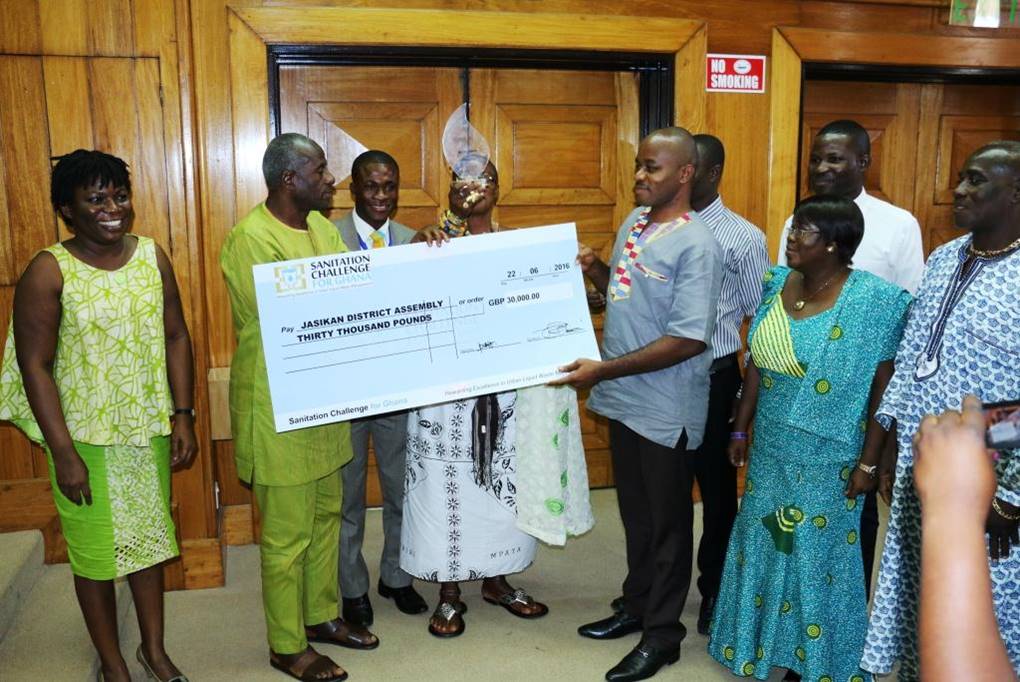Creating a media buzz for an urban sanitation competition in Ghana.
Published on: 06/12/2016
This article is written in cooperation with Abubakari Wumbei.
Metropolitan, Municipal, and District Assemblies (MMDAs) have been motivated to team up with their citizens, innovators and solvers to design and then implement their own liquid waste management strategies. The aim of the Sanitation Challenge for Ghana - with the tagline, rewarding excellence in urban liquid waste management - is to bring about transformational change to poor households in urban centres, through the use of a set of inducement prize competitions.
The Challenge is part of a large action research programme called Ideas to Impact. The idea is to test the applicability and effectiveness of innovation prizes for addressing critical development challenges in climate change adaptation, energy access, and water and sanitation for the world’s poorest people or low-income households. The prize purse of the Sanitation Challenge for Ghana is GBP 1.43 million (US$ 1.8 million).
IRC Ghana, as the lead implementing agent, is among others responsible for the project communications. The Challenge is considered a big game changer and political commitment and community support are essential to make this a success. Creating a big media buzz is therefore key to getting all parties on board.
Various press releases have been issued and picked up in national and international media. For instance the Huffington Post featured the Sanitation Challenge via a blog by Patrick Moriarty. The launch of the Challenge was also published by the Ghana News Agency and Graphic Online. Mrs Vida Duti, director IRC Ghana, specifically appealed to the media to support the objective of the project in a news piece in the Ghana News Agency.
At various stages in the competition radio jingles and adverts are played to raise awareness. Radio announcements, direct radio interviews and talk shows are used to get the messages across; and in some cases live radio coverage of the project's main events such as the zonal workshop in Kumasi. All these activities ensure that competing MMDAs are induced to design and implement innovative liquid waste management strategies for a reward of excellence and public recognition.
The Challenge consists of two stages; the ideas stage (Duapa Award) and the results stage (Dignified City Award). For the first stage three MMDAs were awarded a prize, the Duapa Award, in June 2016, which had a total prize pot of GBP 75.000 (US$ 95.000). Jasikan District, Atiwa Distric and Nanumba North District shared the prize money for excellence in the design of their sanitation strategies.

In the second stage 17 MMDAs are competing for the Dignified City Award for which a total of GBP 1.285 million (US$ 1.6 million) is still available. There are two categories; the first is the Metropolitan and Municipal Assemblies (MMA Category) with a prize award of GBP 400.000 (US$ 508.000) and the second is the District Assemblies (DA Category) with a prize award of GBP 285.000 (US$ 362.000). Honorary prizes will be awarded on specific topics for creativity and unique outcomes like best business and service delivery model; best networks and partnerships for smart investments; best local innovation; best awareness creation and capacity development. Government will not be left out either and will be recognized with a special plaque. IMC, the international lead of the Sanitation Challenge, flagged the innovation aspects in a Question and Answer expert panel in The Guardian.
By 2018, according to Vida Duti, IRC Ghana country director and team leader of the implementing agents, the team will share how "this prize mechanism for delivering aid proves to be a game changer in motivating local governments in Ghana to prioritize sanitation service delivery and creating inclusive government and private sector partnerships to achieve city-wide sanitation". Hopefully, the Ministry of Local Government and Rural Development, the lead government institution will take it up and continue this process.
All relevant information on the Sanitation Challenge is available on a website set up and maintained by IRC Ghana. Regular updates are shared and all relevant information is collected there.
This blog is part of a series on Celebrating IRC Communications that was produced for a special issue of E-Source. For the other articles in this series see the Useful Links below.